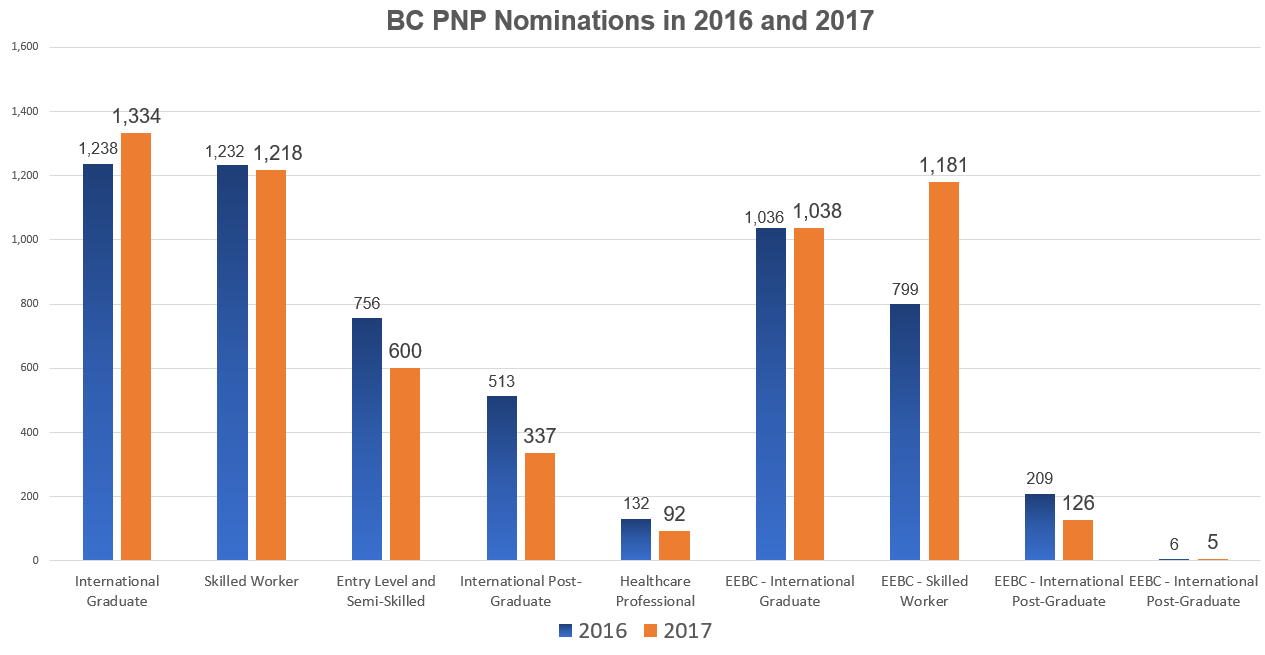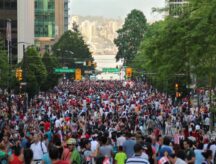British Columbia nominated 2,350 Express Entry candidates in 2017
The province of British Columbia nominated 2,350 Express Entry candidates for Canadian permanent residence in 2017, with a notable boost in the number nominated through its EEBC — Skilled Worker category, a new report shows.
The new provincial government report on the British Columbia Provincial Nominee Program (BC PNP) says nominations through its four Express Entry-linked immigration categories accounted for 39.1 per cent of all nominations for permanent residence issued by B.C. in 2017, up from 34.2 per cent in 2016.
Nine Canadian provinces and two territories have Provincial Nominee Programs, which allow them to nominate a set number of economic immigrants each year for permanent residence.
B.C.'s allocation for 2017 was 6,000 nominations, which the report says it reached.
The Express Entry system manages the pool of candidates for Canada's three main federal-level economic immigration programs — the Federal Skilled Worker Class, the Federal Skilled Trades Class and the Canadian Experience Class.
Express Entry candidates with a provincial nomination receive an additional 600 points toward their Comprehensive Ranking System (CRS) score, essentially fast-tracking them for Canadian permanent residence.
The BC PNP has four immigration categories that are linked to the Express Entry system: EEBC — International Graduate; EEBC — Skilled Worker; EEBC —International Post-Graduate; and EEBC — Healthcare Professional.
The EEBC — Skilled Worker category experienced the most significant year-over-year change of all EEBC categories, growing from 799 nominations in 2016 to 1,181 in 2017.

To find out if you are eligible to enter the Express Entry pool, fill out a free assessment form.
Express Entry candidates who are interested in the BC PNP must register an Expression of Interest in the BC PNP's Skills Immigration Registration System.
Among other criteria, a valid job offer from a B.C. employer is required in order to be eligible for the EEBC — International Graduate, EEBC — Skilled Worker and the EEBC — Healthcare Professional categories.
Applications up by 36% overall
While Express Entry nominations increased in 2017, the number of applications that the BC PNP received from Express Entry candidates decreased, dropping from 45.1 per cent in 2016 to 39.1 per cent in 2017. The report did not offer an explanation for this decrease.
Overall, however, applications to the BC PNP rose by 36 per cent in 2017 over the previous year. A total of 7,307 applications were received in 2017, compared to 5,363 in 2016.
Almost all those applications — 7,201, or 98.5 per cent — came through the various categories under the BC PNP's Skills Immigration Stream, which includes the four Express Entry categories.
The remaining 1.5 per cent, or 106 applications, were applications filed through its Entrepreneur Immigration Stream.
India, China lead source countries
Citizens of India and China led immigration candidates nominated for permanent residence by the province of British Columbia through its Skills Immigration Stream in 2017, receiving 32 per cent and 21 per cent of nominations.
These proportions are essentially the same as 2016, when citizens of India received 32 per cent of Skills Immigration (SI) nominations and citizens of China received 22 per cent.
Other than India and China, the top 10 source countries for Skills Immigration Stream nominees were South Korea, Australia, the United Kingdom, Brazil, Ireland, the United States, Philippines and Iran.
Chinese citizens dominated nominations through British Columbia's Entrepreneur Immigration Stream, receiving 78 per cent of all nominations issued through the stream.
Top occupations
Restaurant and Food Service Managers led the top 10 occupations of those issued nominations under B.C.'s Skills Immigration Stream in 2017. The BC PNP reports that the proportion of nominations issued to candidates in this profession as well as Administrative Assistants "continued to grow in 2017 compared to previous years."
The top 10 occupations contained four in the food service industry, which accounted for 18 per cent of all Skills Immigration nominations in 2017. Other occupations in the top 10 included administrative assistants, transport truck drivers, retail sales supervisors and accounting technicians and bookkeepers.
Overall, the top 10 occupations represented 44.1 per cent of all nominations issued last year.
The BC PNP said that the proportion of overall nominations in tech-related occupations in 2017 was 16 per cent.
Foreign tech workers are the focus of the BC PNP's Tech Pilot, which issues weekly invitations to immigration candidates with an eligible job offer from a B.C. employer in one of 29 priority tech occupations.
To find out if you are eligible for any Canadian immigration programs, fill out a free assessment.
© 2018 CICNews All rights Reserved
- Do you need Canadian immigration assistance? Contact the Contact Cohen Immigration Law firm by completing our form
- Send us your feedback or your non-legal assistance questions by emailing us at media@canadavisa.com





